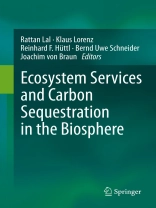Ecological functions and human wellbeing depend on ecosystem services. Among the ecosystem services are provisional (food, feed, fuel, fiber), regulating (carbon sequestration, waste recycling, water cleansing), cultural (aesthetic, recreational, spiritual), and supporting services (soil formation, photosynthesis, nutrient cycling). Many relationships of various degree exist among ecosystem services. Thus, land use and soil management to enhance biospheric carbon sinks for carbon sequestration requires a comprehensive understanding on the effects on ecosystem services. Payments for ecosystem services including carbon pricing must address the relationship between carbon sequestration and ecosystem services to minimize risks of overshoot, and promote sustainable use of land-based carbon sinks for human wellbeing.
Inhoudsopgave
Foreword.- 1 Societal Dependence on Soil’s Ecosystem Services.- 2 Soils and Ecosystem Services.- 3 Ecosystem Carbon Sequestration.- 4 Food Security Through Better Soil Carbon Management.- 5 Soil Carbon and Water Security.- 6 Forests, Carbon Pool and Timber Production.- 7 Ecosystem Carbon and Soil Biodiversity.- 8 Ecosystem Services and the Global Carbon Cycle.- 9 Losses of Soil Carbon to the Atmosphere via Inland Surface Waters.- 10 Why Pests and Disease Regulation Should Concern Mankind.- 11 Natural Hazards Mitigation Services of Carbon-Rich Ecosystems.- 12 Safeguarding Regulating and Cultural Ecosystem Services: Degradation and Conservation Status.- 13 Human Appropriation of Net Primary Production, Stocks and Flows of Carbon, and Biodiversity.- 14 Soil Carbon and Biofuels.- 15 Land Degradation and Ecosystem Services.- 16 The Human Dimensions of Environmental Degradation and Ecosystem Services: Understanding and Solving the Commons Dilemma.- 17 Soil Organic Carbon, Soil Formation and Soil Fertility.- 18 Managing Soil Organic Carbon for Advancing Food Security and Strengthening Ecosystem Services in China.












